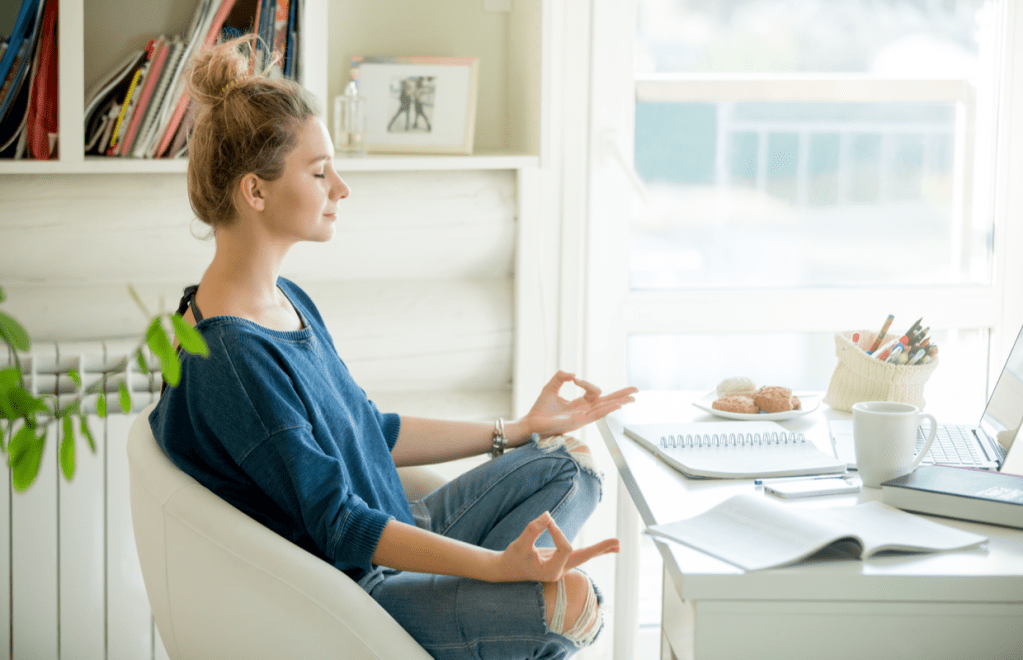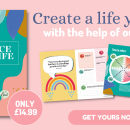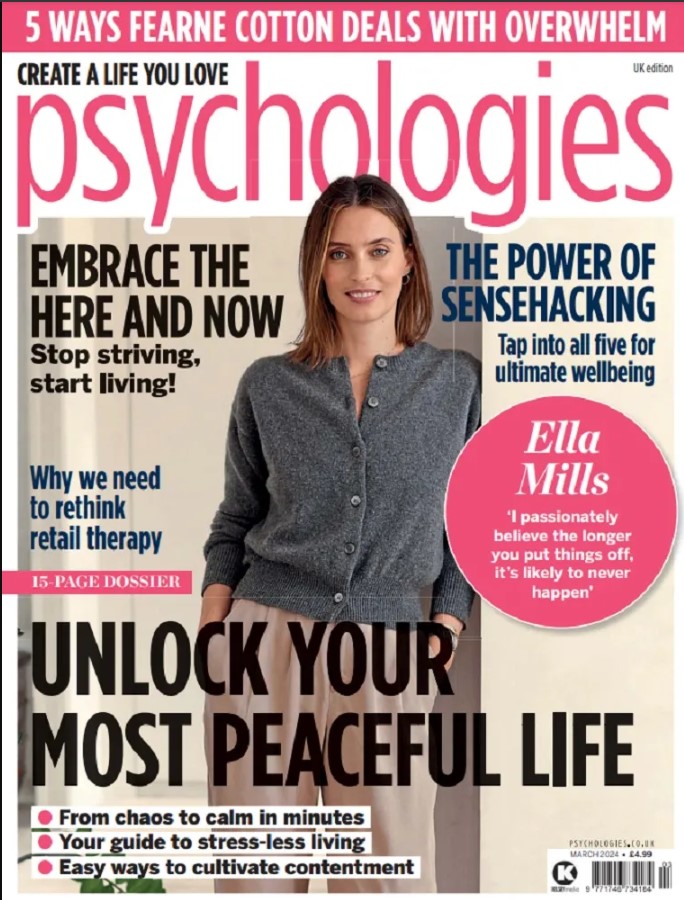7 essential self-care practices to live by
Suzy Walker chats to the experts to curate a manual of essential self care practices to help us navigate any challenges that lie ahead...

During my career as an author and editor, I’ve interviewed so many brilliant experts and met some inspirational people along the way. Over time, I’ve realised that we are so much stronger, more resilient and creative than we think. We survive crisis upon crisis through sheer adrenaline, will and thinking outside the box. But I’ve observed – and learned the hard way myself – that if we are to sustain our efforts and momentum overtime, we need to address our self-care practices.
Here, we invite you to take a deep breath and start to create some daily habits that will top up your energy levels, allow you to rest and keep you grounded as we contemplate an unknown future. If you learn to look after yourself and your health, you will be in a much better position to help the people you love and those who need the most support.
We’ve asked experts and writers to share their best self-care techniques, advice and wisdom – we hope that even if you were to adopt just a handful of these practices, you would feel stronger and better able to cope with whatever life throws at you… now, more than ever.
1. Build a supportive environment for self-care practices
Kim Morgan, CEO of Barefoot Coaching, shares her top self-care practices to help you survive and thrive in difficult times…
Create a strong support network
Even if you are physically in isolation, reach out for help. Make a list of the people who you think could support you in different ways to get through this period, such as people who:
- Have specific skills that could help you
- Are great listeners
- Lift your spirits and make you laugh
- Are good at problem-solving
- Are excellent organisers
- Can connect you to others who may help
Allocate daily ‘worry time’
Rumination is the tendency to keep thinking about things you can’t change, to worry about something that has already happened or might happen, and to replay events in your mind, wondering whether you could have done them any differently.
If you are prone to worry and rumination, try the following: Set aside a specific time every day to worry. Allow yourself only 15 minutes per day. Postpone your worrying until the allocated period, when you can fret as much as you like – but stop at the end of the 15 minutes.
It’s easy to get stuck focusing on the negatives in your life, particularly when you are experiencing the sense of loss and grief brought about by an unexpected change in your life. To redress the balance, sit quietly with a pen and paper and make a list of all the things you are grateful for in your life. This self-care practice will shift your perspective and you are likely to:
- Realise what is important to you
- Appreciate other people more
- Feel a greater sense of calm
- Find it more difficult to focus on the negatives
For coaching from Kim, see barefootcoaching.co.uk.

2. Connect with and cherish the ones you love
Sarah Abell is an author, relationship coach and the founder of The Relationships Academy. She shows us how creating and cherishing strong relationships with our loved ones is an important self-care practice…
Make time to connect with others
I remember a speaker advising his audience to carve out time for their relationships because ‘that slower day never comes’. For many of us, due to the upheavals in the world, we have had to slow down, so how can we take this opportunity to build and improve our relationships with friends, family and neighbours?
If you’re living with people, then this may be an opportunity to create shared memories and get to know each other a whole lot better. Take time to talk about expectations. What are your hopes and fears? How can you give space to the introverts and create social engagement for the extroverts? What activities can you do together to have fun and build connection?
For some of us forced into close proximity with those we have issues with, this will be more challenging. This is a time to face up to and work on those relationships. If your relationship is abusive, get help and get out. Being stuck together may well make things worse. For the rest of us with tricky relationships, take this time to work on them.
Sign up to an online course, get help or read a good book around the issue. Be kind, be honest and spend time really listening and talking to each other. Get inventive with connection. You’ll be improving your relationships and adopting important self-care practices.
Connect with those who are far away
If you have loved ones or friends from whom you are physically separated, connect through the internet, phone or writing. This will be particularly important if you, or they, are on your own. Talk about the things that matter and also the silly, fun or mundane. Get creative and think of activities you could do together, such as forming a mini book club, taking an online class, doing exercises or sharing a meal virtually.
This is also a time when we can reach out to strangers or neighbours, and people we don’t know that well. Let’s build new connections. How can you help people or support them? For those in the NHS or other frontline roles, how can we show our gratitude and appreciation?
None of us asked for this, but just imagine the difference if we all decide to embrace this opportunity to build connection and to value those in our lives. Every day, stop and ask yourself, ‘Who can I reach out to, connect with and cherish today?’ Get creative as you think of ways to do that.
Read Sarah’s book Inside Out: How To HaveAuthentic Relationships With Everyone In Your Life (Hodder & Stoughton, £9.99).
3. Be kind to others
Think self-care practices are all about you? Think again. David Hamilton, author and kindness tsar, explains why being kind not only helps others, but is beneficial to you…
Shift focus from ‘me’ to ‘you’
Studies on kindness show that it creates protection from some mental health issues and even gives our emotions a boost. One of the reasons for this is that kindness takes us out of ourselves, even if only for a moment at a time.
As we move our attention to the immediate needs of another person, our focus shifts away from how we’re feeling. As this happens, brain and body chemistry change towards a more positive state.
The thing with anxiety – and I speak from the personal experience of having struggled with it in my life – is that we want to shrink back when we feel anxious. Kindness, on the other hand, asks us to step up. It invites us to think of others, to empathise with their suffering, to consider their needs and what we can do to help.
In that moment, our focus is no longer on our own anxiety but on the suffering or needs of another. With that shift, some of our anxiety begins to dissolve. The more we do this, the more it dissipates, and our minds and brains begin to understand that kindness really can heal. In this way, kindness ought to be an essential part of our self-care practices.
For kindness cues from David, see drdavidhamilton.com.

4. Create inner self-care and wellness practices
Ali Ro Farrar, journalist, yoga teacher and coach shares her three favourite self-care and wellness practices…
Do a self-care affirmation
As part of my everyday self-care practices, I repeat an affirmation – a short, meaningful phrase or word onto which you place the energy of your awareness through repetition, focus or meditation. The simple act of doing this can make it your truth.
The ancient language of Sanskrit has a word for this– soma – which, in essence, means the flowing of energy through placing your conscious awareness onto someone or something. But there’s some interesting science behind it, too.
By repeating a thought, you strengthen the cognitive connections associated with it in the brain. These connections grow stronger and stronger through a process called cortical thickening, until the thought becomes more habitual, or even a belief.
You can rewire your brain, just as you can through practising mindfulness, to be more present, kinder, less reactive and less judgmental. If one doesn’t come to mind, try, ‘This too shall pass’ or, one of my favourites, ‘May I feel peace’.
Chant yourself away from suffering
If you’ve ever wondered why we chant the sound ‘om’ after yoga, you might be intrigued to discover that this self-care practice is one of those gems where ancient Eastern wisdom meets Western science.
Researchers asked two groups to chant different sounds and studied their brains while they did this. One group chanted ‘om’; the other ‘sssss’. They found that the former experienced significant deactivation of activity in the amygdala – a part of the brain that sits in the limbic system, where our fight or flight responses live. The same deactivation was not found with those chanting ‘sssss’.
‘Om’ creates a vibration that stimulates the vagus nerve, which plays a large role in feeding information between the brain and the workings of the body – the stimulation has a calming effect on digestion, heart rate and breathing, moving us into a state of rest and digest.
When we are troubled or struggling with something, chanting ‘om’ has the ability to reduce anxiety, fear and perceived threat, creating stillness and clarity in our minds. It’s a great alternative meditation. Sit for three minutes and release a long drawn-out ‘om’ with one breath, and repeat. Pause for as long as you need after you have finished and relax into the benefits.
Boost your self-care with mindfulness practices
Another simple self-care practice is to close your eyes, bring your mind to your breath and ask yourself, ‘How do I feel?’. Ask the same question again, and then a third time, to focus on it and explore your feelings in that exact moment.
Once you’ve identified an emotion, notice where it is in your body and try to look at it with unbiased curiosity, asking whether it is negative or positive. If it’s negative, ask if you can sit with it, looking at it without trying to push it away or change it. If it’s positive, ask if you can let it be there without embracing it in a deeper way.
Turning towards our emotions, acknowledging them and allowing them to be there without judgment, but with compassion, actually makes them more bearable to deal with; it often diminishes their power and stops them shouting at us so loudly.
This might take an element of acceptance; not in the sense that we allow ourselves to be ruled by our emotions, but an active acceptance that this is the way things are – at least for now, in this moment.
Ali’s book, The Wellfulness Project: A Manual For Mindful Living (Octopus, £16.99), is out now.
5. Breathing deeply and eating well are self-care practices
Nutritional therapist and author Eve Kalinik suggests effective ways to support your immune system and keep your gut happy…
Keep calm with breathwork
I am a nutritionist but my best advice is to engage in diaphragmatic breathing, sometimes referred to as slow abdominal breathing, which helps to lower stress and anxiety associated with the fight or flight response, via stimulation of the vagus nerve. It can also help to regulate heart rate, which can increase when we are anxious or stressed.
Do it as part of a daily self-care practice, or as needed in a particularly stressful period. A simple way to do this is to dedicate five minutes to simply inhaling through the nose, filling the lungs completely, and slowly releasing the air through the mouth.
Nourish your immune system
Nutrition is often overlooked, but eating well is a key self-care practice we should all be doing to look after our bodies. When eating to support the immune system, aim to get plenty of plant-based foods in as many different colours as possible. This will provide myriad sources of fibre and antioxidants for the gut and the immune system – remember that 70 to 80 per cent of the immune system is located in the gut.
Vitamin C is important for the immune system and can be found in foods such as broccoli, cauliflower, kale, peppers and all types of berries; as is vitamin A, which is in sweet potatoes, butternut squash, peppers, leafy greens, eggs and cheese.
Fermented foods, such as live yoghurts, cheese, kefir and sauerkraut, can provide sources of beneficial bacteria for the gut. And vitamin D, which we get from exposure to sunlight, is key – so consider supplementing.
For nutritional nous from Eve, see evekalinik.com.

6. Limit your consumption of news and social media
Looking to adopt self-care practices into your day-to-day life? Writer Clem Felix recommends being careful about what, and how much, information you let in…
Tune out to tune in
Last year, feeling overwhelmed by worrying news, I took a media diet. For one month, I read no news at all and logged off from all social media. It was life-changing for me. To anyone who is feeling overwhelmed, I’d recommend taking a close look at the news and social media you’re consuming, and how often.
I now try to stick to reading news from one trusted source, once a day. In the past, if I read something alarming, I’d go from one website to another, to social media, and so on, trying to find out more and more. In the process, my brain would become overwhelmed and jam into an anxious gear. Reading less helped me gain much-needed perspective. It also helped me pace myself and process any emotions that came up.
As UKCP psychotherapist Fe Glover said to me: ‘It can be panic-inducing to be in silence and many people have a tendency to go from one thing to another. When you’ve got more mental space, your system shows you more. You start to notice your feelings and thoughts, which can be uncomfortable, but the cost of not doing this is that we lose connection with ourselves. It is about balance.’
I learned, when I read something alarming, to sit with those feelings, to really feel them, and that in doing so they drained away. As a result, I found that I felt much calmer and happier, and more adept at problem-solving. I was able to respond to events, rather than react to them.
I am very aware of the effect news has on me – and I am much more confident in curating what information I allow in. The mute button on the remote control has become a good and well-used friend in my collection of self-care practices.
7. Let your imagination run wild
Adventurer, entrepreneur and coach Fi Macmillan has worked with leaders across the world, helping them inspire people in their organisations. If you’re spending time at home or self-isolating, try these simple self-care practices:
- Put photos of your favourite outdoor places on your phone, desk or walls.
- Sit by an open window, enjoy the sky, cloud patterns, and whatever beauty you can see in your view. Give yourself 10 minutes with no interruption doing this.
- Put talismans of great outdoor experiences on your desk, such as favourite stones, flowers or feathers.
- Imagine the next outdoor adventure you are going to take. Follow a long-distance footpath or go wild camping up a mountain. Imagine it, plan it and talk to people about it.
For wild wisdom from Fi, see wildleadership.co.uk.






